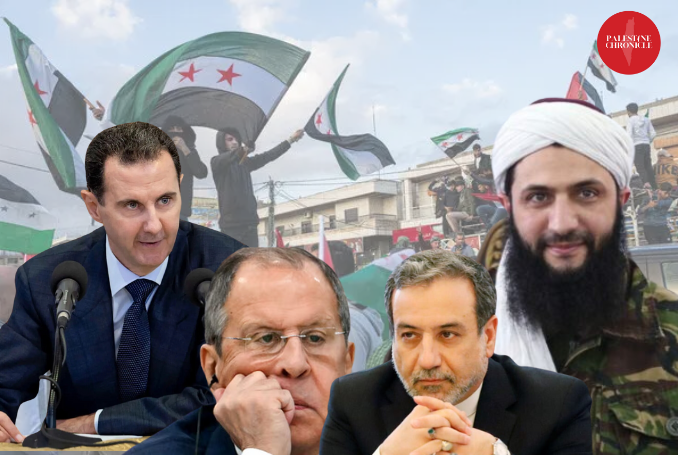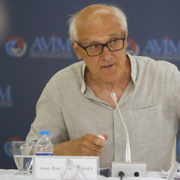
By Jeremy Salt
A stubborn obstacle in the way of western governments and their Arab world ‘allies’, Syria has been targeted ever since 1918.
Syria has fallen. It is not just Bashar al-Assad or ‘the regime.’ As much as Syrians might be against both, or might have turned against them in the wake of the HTS victory, they are only the lightning rods. Syria itself is the real target.
A stubborn obstacle in the way of western governments and their Arab world ‘allies’, Syria has been targeted ever since 1918. Now this central arch in historical resistance to western domination, long before it became part of an ‘axis,’ has finally been broken.
The secular government has gone and Syria has been taken over by a coalition of armed groups welded together by Hayat Tahrir al-Sham (HTS), an outgrowth of Al Qaida and the Islamic State.
Its professions of latter-day moderation are calibrated to win and maintain western support. Some of its members have even declared their ‘love’ of Israel. This should not be all that surprising seeing that Israel backed the armed groups with weapons and hospital treatment in Israel from early in the war. Still, a strange position for fighters supposedly with the best interests of the Arabs and Muslims at heart.
Hezbollah and Iran have now lost the land bridge between them, and the Palestinians are more alone than ever. Israel is under even less pressure in Gaza, where no doubt it will soon begin colonizing the north as well as annexing the West Bank. With Trump coming into power, the full backing of the US will be even fuller.
The questions swarm as to how all of this could have happened and to have happened so quickly. Within less than two weeks (November 27 – December 8) all of Syria fell, with such clockwork precision that it could have been scripted.
It is difficult to believe that the combined intelligence agencies of Syria, Russia and Iran did not see what was brewing in Idlib but, irrespective of that, once the offensive was launched they did little to stop it. Resistance by the Syrian military across the country was minimal, as if that too was scripted.
The lead figure behind the forces coming out of Idlib was Tayyip Erdogan. Turkiye was the pivot on which the campaign against the Syrian government turned in 2012. It was through Turkiye that jihadists came from all over the world to join the takfiri groups in Syria, all of them ideological clones of the Islamic State.
The capture of Aleppo was a principal objective of the Turkish president at that time. In the recent offensive Aleppo would have been a grand prize just in itself but it was rapidly followed by the fall of Hama, Homs and then Damascus, with President Bashar al Assad and his family apparently leaving on the last plane out of Damascus and now given asylum in Moscow.
The triumph of HTS could not have happened without the primary role played by Turkiye. In northwest Syria it trained its own ‘Syrian National Army.’ All supplies and support for the ‘rebels’ had to come across the Turkish border. Apart from direct control of north-western Syria, HTS governed Idlib under Turkiye’s protection.
Meeting in Astana, the capital of Kazakhstan, in 2018 and 2020, Turkiye, Iran and Russia agreed on the need for ‘de-escalation’ in Idlib, agreed on the rejection of all attempts to create new realities on the ground in Syria, agreed in their determination to eliminate the Nusra front and all groups associated with Al Qaida and the Islamic State and agreed that there could be no military solution to the Syrian conflict.
in 2019 the three governments had also expressed their “serious concern” at the “increased presence and terrorist activities” of HTS and affiliated groups, again stressing their determination to eliminate Jabhat al Nusra and all groups associated with Al Qaida and the Islamic State.
These principles turned out to be not worth the paper they were written on, as the recent ‘military solution’ to the Syrian conflict alone demonstrates, without any mention of the other breaches of the agreed principles.
Sometime in the past year it is clear that Russia had to make a hard decision on Syria. It was three years into a war of attrition fought against NATO and its Ukrainian proxy that was growing more dangerous by the day.
It was surrounded by NATO bases, the largest of all, bigger than Ramstein in Germany, currently being constructed in southern Romania. The population around its borders was being prepared for war. It was facing a renewed threat in Georgia, where anti-government demonstrations have spread across the country in recent weeks. A plot modeled on the overthrow of the Ukrainian government is being alleged by Georgian government ministers and the media.
Against this background, and putting the home front first, Russia decided it could not afford any more military support for Syria. Possibly a deal was done with the US on the basis of a Russian standdown in Syria in exchange for a US standdown in Ukraine. With Russia unable to back Syria any longer, Iran also fell back.
In what almost reads like an apology in advance, Russian Foreign Minister Sergei Lavrov said in July this year that “we are very much sorry for the Syrian people who became yet another geopolitical experiment. We are absolutely convinced of the inadmissibility of using terrorists like Hayat Tahrir al-Sham to achieve geopolitical purposes… we’re not sorry about the image people have of the Russian Federation – or me personally – but we are deeply concerned about the fate of the Syrian people.
“We don’t want them to suffer the same fate as the Iraqis, Libyans, and other nations who were disturbed by those desiring to maintain their domination.” In fact, the Syrian people had already suffered that same fate in the first ferocious years of the attack on their country.
It will take some time for the full extent of this victory of the west and its Middle Eastern allies, principally Turkiye and Israel, to sink in but Syria as a stubborn holdout against western-Israeli hegemony since 1918 has finally been brought down.
The west, through its direct involvement and through the support of its allies and proxies, has finally succeeded in pulling the plug out of the physical heart of the Middle East and its cultural and political heart as well. Syria, the ‘beating heart of Arabism,’ has been stilled, for the time being and possibly for a long time to come.
The secular west has supported the uprooting of a secular government in Damascus by the offspring of Al Qaida and the Islamic State. HTS – previously Jabhat Nusra al-Sham and previous to that just the Nusra front – claims it is a changed movement, despite the long record of atrocities committed within its ranks.
Abu Muhammad al Julani, nom de guerre of Ahmad Husein al Shar’a, its emir, now appears before the cameras in a well-pressed green jacket, somewhat similar in color to Zelensky’s t-shirts, with his beard neatly trimmed and promising that all ethno-religious groups will be safe.
He is hardly to be taken at his word. In 2020 both “pro-government forces” and HTS were accused by the UN’s special committee on Syria of “flagrantly” violating the laws of war in the battle for Idlib.
According to the committee, HTS “terrorists” had pillaged the homes of civilians and “detained, tortured and executed civilians expressing dissenting opinions, including journalists. Female media workers were doubly victimized.” HTS had “indiscriminately shelled densely populated civilian areas, spreading terror among civilians living in government-held areas.”
Apart from the harsh Islamic rule imposed in Idlib, HTS is a designated terrorist organization in the US and other countries. Julani himself has had a $10 million bounty placed on his head by the US, which now has to reconcile the contradictions in its position as it celebrates the overthrow of the Syrian government by what it officially regards as a terrorist organization.
The downfall of the Syrian government is indeed an overwhelming victory for the west and Israel. The axis of resistance has been broken in the middle. It is no longer three major, strategically unified parts but two separated parts whose effectiveness as resistance movements has been greatly diminished.
Hezbollah was already severely damaged by the assassination of its leaders and battlefield losses. It was forced to accept a ceasefire which Hasan Nasrallah had said it would never do unless there was one in Gaza. This was an agreement which in the specific context of Lebanon and the interests of a people massacred and driven out of their homes by Israel, Hezbollah had no option but to accept.
Without its allies, with its supply lines across Syria to Iran cut or about to be cut by the HTS-led alliance, Hezbollah’s future as a resistance movement now seems more Lebanese than regional. It can protect Lebanon from further Israeli attacks but can do little on the broader front.
More than ever the Palestinians are on their own if ‘more than ever’ can be imagined after the daily atrocities of the past year. Israel has been able to commit flagrant genocide without international intervention to stop it, yet after Syria, it has even greater freedom of movement than before. It is ready to annex the West Bank and no doubt will soon start colonizing north Gaza.
Now is not the time to speculate where the situation in Syria will go from here. HTS says It wants to establish a viable government for all of Syria, but given the fractures across the country, even in the short term that seems unlikely. Among them, the anti-YPG/SDF policies of the Turkish government, HTS’s primary backer, are diametrically opposed to US support for the Kurds.
By comparison to the sectarianism deliberately brought into Syria by outside governments and their takfiri proxies, under the Syrian government there were no minorities, only Syrians of different ethnic and religious backgrounds.
It is greatly to be hoped that after years of war, massive destruction, and the loss of hundreds of thousands of lives, the Syrian people will finally have some peace. At the same time, the removal of Syria from the ‘Arab front’ is a huge triumph for Israel and the west and a great setback in the continuing struggle against US/Israeli hegemony across the Middle East.
The Syrian crisis brings the Middle East to the verge of the greatest imperial shakeup in the region since the Sykes-Picot map was drawn in 1916 and put into effect at the San Remo conference in 1920.
Yet, resistance hardened by the unprecedented viciousness of the genocide in Gaza will continue in old and new forms on the Palestinian and Arab fronts, as it has after every setback in the past 100 years.

– Jeremy Salt taught at the University of Melbourne, at Bosporus University in Istanbul and Bilkent University in Ankara for many years, specializing in the modern history of the Middle East. Among his recent publications is his 2008 book, The Unmaking of the Middle East. A History of Western Disorder in Arab Lands (University of California Press) and The Last Ottoman Wars. The Human Cost 1877-1923 (University of Utah Press, 2019). He contributed this article to The Palestine Chronicle.